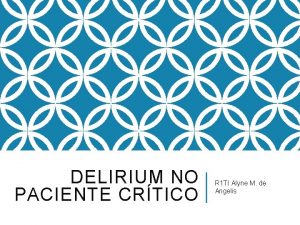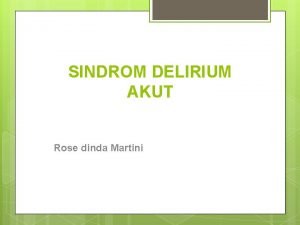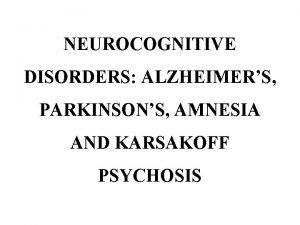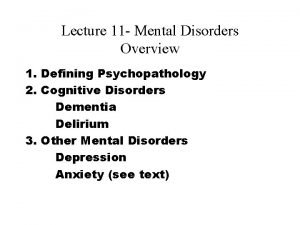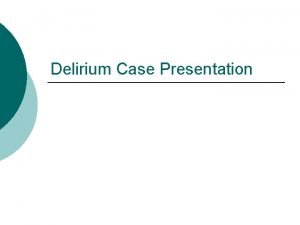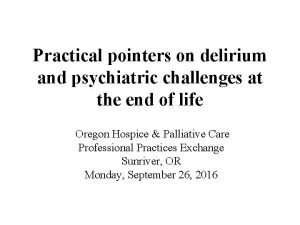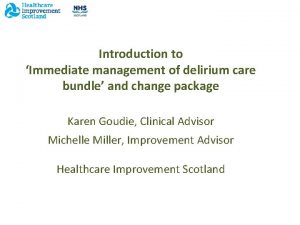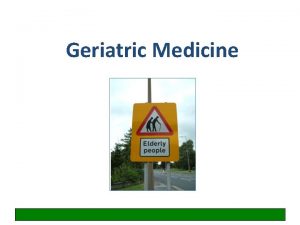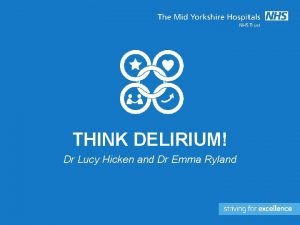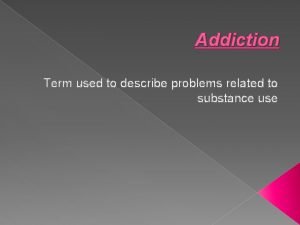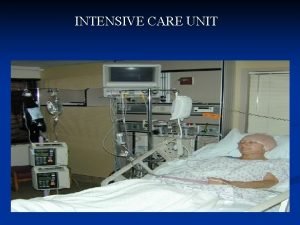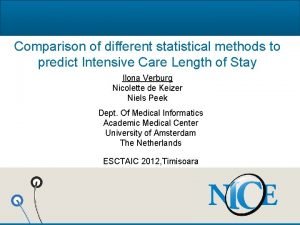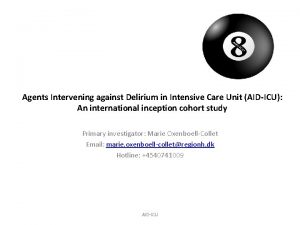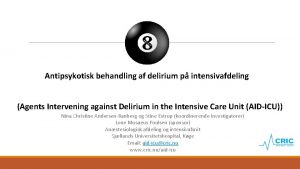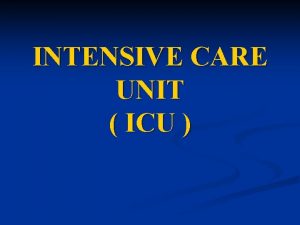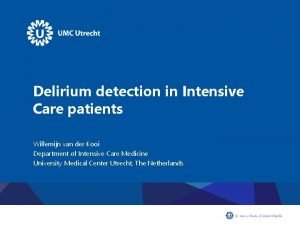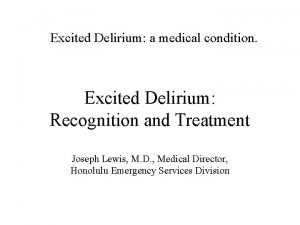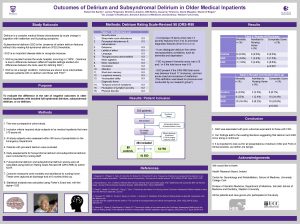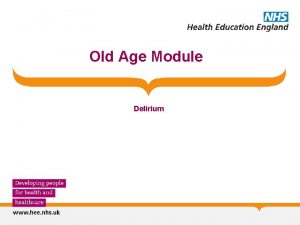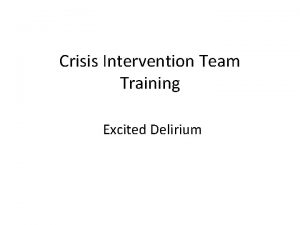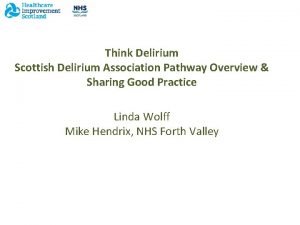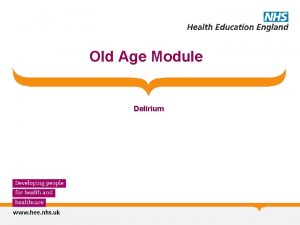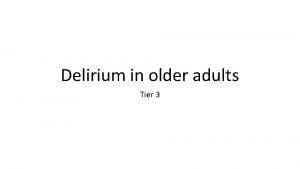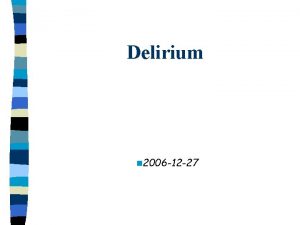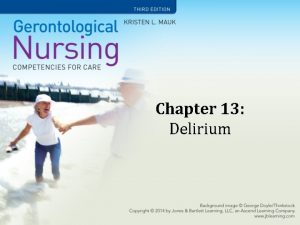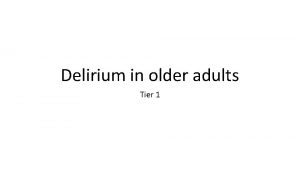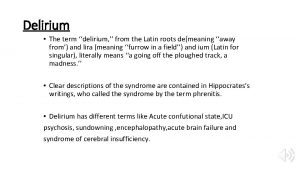Agents Intervening against Delirium in the Intensive Care
























- Slides: 24

Agents Intervening against Delirium in the Intensive Care Unit (AID-ICU) Nina Christine Andersen-Ranberg (coordinating investigator) Lone Musaeus Poulsen (sponsor) Department of Anaesthesiology and Intensive Care Medicine Zealand University Hospital, Koege Email: aid-icu@cric. nu www. cric. nu/aid-icu

Delirium in the Intensive Care Unit § Critically ill patients are at risk of developing delirium during ICU stay incidence: 32 -84%1, 2 Delirium is associated with: § Increased morbidity 3, 4 § Increased days on mechanical ventilation § Longer hospital admittances Delirium is expensive to § Long-term cognitive impairment the individual and society § Long-term disability § Higher cost of care And is an independent predictor of mortality 5 1) Salluh, J. I. , et al. , Outcome of delirium in critically ill patients: systematic review and meta-analysis. BMJ, 2015. 350: p. h 2538. 2) Brummel, N. E. , et al. , Delirium in the ICU and subsequent long-term disability among survivors of mechanical ventilation. Crit Care Med, 2014. 42(2): p. 369 -77. 3) Pandharipande, P. P. , et al. , Long-term cognitive impairment after critical illness. N Engl J Med, 2013. 369(14): p. 1306 -16. 4) Lat, I. , et al. , The impact of delirium on clinical outcomes in mechanically ventilated surgical and trauma patients. Crit Care Med, 2009. 37(6): p. 1898 -905. 5) Ely, E. W. , et al. , Delirium as a predictor of mortality in mechanically ventilated patients in the intensive care unit. JAMA, 2004. 291(14): p. 1753 -62.

Delirium and mortality Kaplan-Meier survival curve for 1 -year mortality post-intensive care unit (ICU) admission (ICU delirium days predictor). Pisani, Kong, Kasl, et al. : Delirium and Mortality in Older ICU Patients. American Journal of respiratory and critical care 2009.

Current guidelines - The Danish society of Anaesthesiology and Intensive Care Medicine - The Intensive Care Society in the UK - German guidelines Haloperidol Olanzapin Risperidon - The American College of Critical Care Medicine and the Society of Critical Care Medicine (USA) No evidence of haloperidol Olanzapin may reduce delirium duration

Aim of the AID-ICU trial To assess the benefits and harms of haloperidol treatment in critically ill adults with delirium Harms Benefits Mortality

Methods § Design: Investigator-initiated, randomised multicentre placebo-controlled clinical trial with blinding § Setting: approx. 25 ICUs in Europe § Population: Adult ICU patients with diagnosed delirium § Start June 2018, Zealand University Hospital Køge

Design 1000 patients Intervention Haloperidol 2. 5 mg x 3 daily Control Placebo: isotonic saline Primary outcome: Days alive out of the hospital within 90 days

Delirium screening is essential! § Screening for delirium twice daily should be implemented as standard care § 1 time during the morning shift § 1 time during the evening shift § Screen with validated screening tool CAM-ICU or ICDSC § When a patient is diagnosed with delirium check if the patient comply with inclusion criteria.

CAM-ICU

ICDSC

Inclusion criteria ü Acute (unplanned) admission to the ICU ü Aged 18 years or above ü Diagnosed delirium with validated screening tool (CAM-ICU, ICDSC) All patients that fulfil inclusion criteria are screened for inclusion in the AID-ICU database. If the patient fulfil one or more exclusion criteria this is registered in the screening process and the patient is not included

Exclusion criteria Contraindications to haloperidol Habitual treatment with any antipsychotic medication or treatment with antipsychotics in the ICU prior to inclusion Permanently incompetent (e. g. dementia, metal retardation) Delirium assessment non-applicable (language barriers, blind, deaf) Withdrawal from active therapy or brain death Fertile women (<50 years) with positive urine h. CG or plasma h. CG Patients under coercive measures by regulatory authorities Patients with alcohol induced delirium (delirium tremens) Consent unobtainable according to national regulations

Interventions Acute ICU admittance Delirium screening x 2 daily Positive for delirium Haloperidol 2. 5 mg (0. 5 ml) x 3 Screening Does not meet exclusion criteria P. n. haloperidol/placebo to a total of 20 mg daily (5 additional administrations) Escape medicine: Propofol sedation, benzodiazepines and dexmedetomidine/α 2 -agonist Randomisation Placebo: Na. Cl 0. 5 ml x 3

Pausing and stopping Pausing criteria: 2 consecutive negative delirium scores in the same day OR unexplained coma (and all other relevant medication stopped) Stopping criteria: § Discharge from the ICU § Transfer to another ICU (non AID-ICU trial site) § Maximum of 90 day intervention period § Death

Administration of trial medicine § Dispensed from the database with a common login § Packs of 3 vials, all of which are used for a single patient § Extra packs can be drawn as needed § Educational material is available from www. cric. nu/aid-icu

Administration of trial medicine § Go to www. cric. nu § Click on AID-ICU trial § Click on Trial Medication § Common login with site ID and password

Administration of trial medicine

Administration of trial medicine

Withdrawal A patient can be withdrawn from the trial if: 1. 2. 3. 4. 5. Consent is withdrawn or not given The patient experiences intolerable adverse reactions (including SAR and SUSAR) suspected to be related to the trial intervention. Clinicians discretion in conjunction with the coordinating investigator decide it is in the patient’s interest The patient after inclusion is subject to involuntary hospitalization (coercive measures) The patient after inclusion experiences QTc prolongation. ◦ Fill in the withdrawal form in the e. CRF (www. cric. nu/aid-icu) ◦ Continue data registration (daily forms) unless consent for this is also withdrawn

90 -day follow-up www. cric. nu/aid-icu - Mortality (including date of death) - Discharge from hospital (date of discharge) - Readmission to hospital (days readmitted within the 90 -day period)

One-year follow-up www. cric. nu/aid-icu - Mortality (also drawn from the CPR registry in Denmark) - Euro. Qo. L (EQ-5 D-5 L + EQ-VAS) - RBANS (Cognitive function score) at selected sites

Trial documents www. cric. nu/aid-icu

Contact Do you need help? Call the AID-ICU hotline at: +45 9357 7750 Available 24/7

Thank you! AID-ICU@CRIC. NU WWW. CRIC. NU/AID-ICU
 Example of intervening phrase in a sentence
Example of intervening phrase in a sentence Intervening phrase
Intervening phrase Delirium care pathways
Delirium care pathways Escala cam delirium
Escala cam delirium Escala rass
Escala rass Sindrom delirium akut
Sindrom delirium akut Amnesia
Amnesia Acute confusion related to
Acute confusion related to Delirium case presentation
Delirium case presentation Nash delirium
Nash delirium Driver diagram palliative care
Driver diagram palliative care Delirium definition
Delirium definition Pinch me delirium
Pinch me delirium Francisco fernandez md
Francisco fernandez md Flocculation delirium
Flocculation delirium Terminalt delirium
Terminalt delirium Excited delirium перевод
Excited delirium перевод Difference between dementia and delirium
Difference between dementia and delirium Gcs 456
Gcs 456 Primary secondary tertiary medical care
Primary secondary tertiary medical care Concept of intensive care unit
Concept of intensive care unit Intensive care units
Intensive care units Tư thế worms-breton
Tư thế worms-breton Thế nào là hệ số cao nhất
Thế nào là hệ số cao nhất ưu thế lai là gì
ưu thế lai là gì




